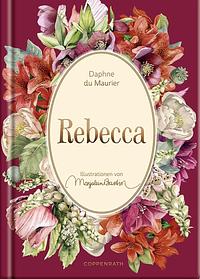Take a photo of a barcode or cover
challenging
dark
emotional
mysterious
reflective
tense
slow-paced
Plot or Character Driven:
A mix
Strong character development:
Yes
Loveable characters:
No
Diverse cast of characters:
No
Flaws of characters a main focus:
N/A
I usual have something to say on these but I’m not feeling very creative today, My cat is sitting next to me tho he’s pretty cute
mysterious
slow-paced
Loveable characters:
Complicated
Flaws of characters a main focus:
Yes
medium-paced
dark
mysterious
tense
medium-paced
Plot or Character Driven:
Character
Strong character development:
Complicated
Loveable characters:
No
Diverse cast of characters:
Yes
Flaws of characters a main focus:
Yes
I don't know what I was expecting from this book. First, is a modern book ( telephone, electricity) I thought that it was a Victorian era book. You always hear the same thing about Rebecca. That Rebecca is dead and how she is still much presence in the house. About the book being gothic. But I really didn't know about the plot and I was pleasantly surprised. I never imagined the twist and the ending. Rebecca was a very mean person and had very little empathy toward the others. She controlled her story and how people will perceive her. And all these with the help of her Nanny.
dark
mysterious
tense
fast-paced
Plot or Character Driven:
A mix
Strong character development:
Yes
Loveable characters:
Complicated
Diverse cast of characters:
No
This book grabbed me by the lapels, whispered: you won't be able to put me down, you're not gonna predict a single plottwist and you will read the beginning immediately after finishing the last chapter. And it was't lying 🙏🏻🙏🏻🙏🏻
dark
emotional
tense
medium-paced
Plot or Character Driven:
Character
Strong character development:
Complicated
Loveable characters:
Complicated
Diverse cast of characters:
No
Flaws of characters a main focus:
Yes
dark
mysterious
reflective
sad
tense
fast-paced
Plot or Character Driven:
A mix
Strong character development:
Yes
Loveable characters:
Yes
Diverse cast of characters:
No
Flaws of characters a main focus:
Complicated
emotional
mysterious
reflective
slow-paced
Plot or Character Driven:
A mix
Strong character development:
Complicated
Loveable characters:
Complicated
Diverse cast of characters:
No
Flaws of characters a main focus:
Yes
dark
mysterious
tense
fast-paced
Plot or Character Driven:
A mix
Strong character development:
Complicated
Loveable characters:
No
Diverse cast of characters:
No
Flaws of characters a main focus:
Yes
Themes or Characters That Resonated with Me:
I found Rebecca incredibly suspenseful, especially from the moment the second Mrs. de Winter excitedly prepares for the ball. The moment she descends the staircase and receives a shocking reaction had me unable to put the book down. Throughout, I was constantly trying to decipher who was truly an ally to the narrator and who remained loyal to Rebecca—characters like Bee, Giles, Frank, Robert, Frith, and Favell all had me questioning their loyalties.
The narrator’s desperation for Maxim’s admiration was fascinating. A strictly rational person would be horrified to discover their husband murdered his first wife, but instead, she feels relief. The fact that Maxim never loved Rebecca brings her happiness, which raises the question—what is she really in love with? The idea of love, or Maxim himself? At the same time, Maxim’s story paints him as a man trapped in a nightmare marriage, driven to the edge. While I don’t find Maxim particularly admirable—especially since he seems to have married the narrator primarily to avoid loneliness—his confession scene hit me like a ton of bricks.
Frank Crawley stood out as the most respectable character, and I found Mrs. Danvers compelling. Favell, despite being a villain, was incredibly well-written and entertaining to read.
Emotions, Thoughts, or Memories It Brought Up in Me:
The novel made me reflect on how far people will go for love—or what they believe to be love. The narrator sacrifices her own sense of self and morality just to feel secure in her marriage. The moment when Maxim admits to killing Rebecca was shocking and beautifully written. The entire sequence where Favell attempts to blackmail Maxim and Maxim, rather than trying to avoid justice, remains determined to see the investigation through, was incredibly suspenseful.
The novel’s coroner scenes reminded me of Les Misérables—specifically when Monsieur Madeleine (Jean Valjean) faces the moral crisis of revealing his true identity. Meanwhile, the extended confrontation between Favell, Maxim, and Colonel Julyan gave me the same kind of suspense as Crime and Punishment, particularly Raskolnikov’s interrogation by Porfiry Petrovich. Both moments are about far more than the crime itself; they ask a deeper question—who is the criminal now that they have done what they’ve done?
The ending felt bittersweet. On the one hand, Maxim and the narrator seem free of the past and can move on together. On the other hand, Manderley’s destruction could symbolize that they will never truly escape the shadow of Rebecca.
Opinion About the Author or Writing Style:
Du Maurier’s writing is masterful in its ability to build suspense. Even in the quieter, early parts of the book, there’s a constant feeling of unease. The way she slowly peels back layers of deception and hidden truths makes the book impossible to put down. Her ability to craft intense psychological drama—especially through the narrator’s insecurities and the looming presence of Rebecca—was excellent. The dialogue-heavy climax between Maxim, Favell, and Colonel Julyan was incredibly engaging, despite being primarily conversation-based.
Favorite Passages:
Maxim’s confession—it was so unexpected and beautifully written.
Favell’s blackmail attempt—the intensity of the confrontation and Maxim’s resignation to whatever consequences may come.
The final reveal about Rebecca’s illness—I fully expected her to have been pregnant, not terminally ill.
My ratings-
Writing Style: 95
Relatability: 90
Originality: 100
Personal impact: 90
Plot: 95
I found Rebecca incredibly suspenseful, especially from the moment the second Mrs. de Winter excitedly prepares for the ball. The moment she descends the staircase and receives a shocking reaction had me unable to put the book down. Throughout, I was constantly trying to decipher who was truly an ally to the narrator and who remained loyal to Rebecca—characters like Bee, Giles, Frank, Robert, Frith, and Favell all had me questioning their loyalties.
The narrator’s desperation for Maxim’s admiration was fascinating. A strictly rational person would be horrified to discover their husband murdered his first wife, but instead, she feels relief. The fact that Maxim never loved Rebecca brings her happiness, which raises the question—what is she really in love with? The idea of love, or Maxim himself? At the same time, Maxim’s story paints him as a man trapped in a nightmare marriage, driven to the edge. While I don’t find Maxim particularly admirable—especially since he seems to have married the narrator primarily to avoid loneliness—his confession scene hit me like a ton of bricks.
Frank Crawley stood out as the most respectable character, and I found Mrs. Danvers compelling. Favell, despite being a villain, was incredibly well-written and entertaining to read.
Emotions, Thoughts, or Memories It Brought Up in Me:
The novel made me reflect on how far people will go for love—or what they believe to be love. The narrator sacrifices her own sense of self and morality just to feel secure in her marriage. The moment when Maxim admits to killing Rebecca was shocking and beautifully written. The entire sequence where Favell attempts to blackmail Maxim and Maxim, rather than trying to avoid justice, remains determined to see the investigation through, was incredibly suspenseful.
The novel’s coroner scenes reminded me of Les Misérables—specifically when Monsieur Madeleine (Jean Valjean) faces the moral crisis of revealing his true identity. Meanwhile, the extended confrontation between Favell, Maxim, and Colonel Julyan gave me the same kind of suspense as Crime and Punishment, particularly Raskolnikov’s interrogation by Porfiry Petrovich. Both moments are about far more than the crime itself; they ask a deeper question—who is the criminal now that they have done what they’ve done?
The ending felt bittersweet. On the one hand, Maxim and the narrator seem free of the past and can move on together. On the other hand, Manderley’s destruction could symbolize that they will never truly escape the shadow of Rebecca.
Opinion About the Author or Writing Style:
Du Maurier’s writing is masterful in its ability to build suspense. Even in the quieter, early parts of the book, there’s a constant feeling of unease. The way she slowly peels back layers of deception and hidden truths makes the book impossible to put down. Her ability to craft intense psychological drama—especially through the narrator’s insecurities and the looming presence of Rebecca—was excellent. The dialogue-heavy climax between Maxim, Favell, and Colonel Julyan was incredibly engaging, despite being primarily conversation-based.
Favorite Passages:
Maxim’s confession—it was so unexpected and beautifully written.
Favell’s blackmail attempt—the intensity of the confrontation and Maxim’s resignation to whatever consequences may come.
The final reveal about Rebecca’s illness—I fully expected her to have been pregnant, not terminally ill.
My ratings-
Writing Style: 95
Relatability: 90
Originality: 100
Personal impact: 90
Plot: 95





